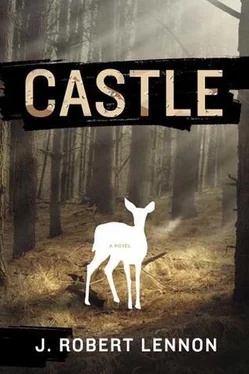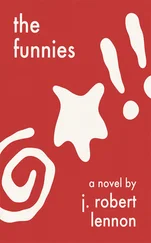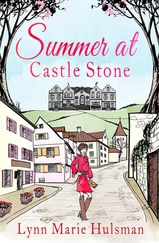There must have been a full moon, or close to it, because the darkness never enveloped me completely. In a sense, I could actually see better this way — my field of vision, limited by the dim, was more focused, and I was not
confused by the enormity of the forest. I moved steadily, feeling from tree to tree, careful not to walk in a circle by mistake. I was thinking of the drive here and back with my father — many of the roads we traveled upon ran along creeks or ditches, and there had been rain the day before. If I walked in a straight line for as long as possible, I would eventually come to a road, and beside that road there might be water. It wasn’t much of a plan, but it was the first real plan I had come up with, and it gave me the impetus to move.
I walked for hours, or what seemed like hours. And eventually, I was rewarded with a sound: the very faint gurgle of water.
I wanted to increase my pace. But the woods here were unusually thick, and I was forced to grope toward the noise. It was real, though, the distinct sound of a creek, straight ahead. It seemed like an hour or more before I reached it, and when I did, I nearly fell in — the trees ran right up to its edge, and the bank dropped off sharply, straight down into the water. The stream was perhaps four feet wide, and flowed quickly, considering it was late summer. Bracing myself against an exposed root, I stepped gingerly into the current.
My relief was profound. So good did the cool water feel on my aching, wounded feet, that I let out a mad-sounding laugh. I bent down and scooped up a double handful of water, intending to examine it in the dim moonlight, to see if it was too silty or muddy to drink. But once I had brought it to my face, I couldn’t resist. I gulped it down, then fell to my knees and thrust my face into the current. I gulped in long, choking draughts until I was sated, then I sat up, grew dizzy, and collapsed on my back into the creekbed. It was only a few inches deep, and I lay there with the water running over and around me, and thanked the God that I don’t think I had ever before believed in. I may even have slept there, with the water lapping against my cheeks, and the forest canopy moving above me, shifting and throbbing, a darker black against the faintly glowing black of the sky.
Indeed, I must have slept, because I remember waking to even deeper night, and cold. I was cold there, in the water, freezing in fact, and I began to shiver, so violently that I thought I might break apart. I sat up and let out a cry, and saw a smear of movement out of the corner of my eye.
It was a ghost.
Or so I thought at first. It stared at me out of round black eyes; its chest was broad, its hair white and strangely peaked above the ears. It stood on a pair of spindly legs and appeared to have no arms at all.
I stared at it, and it stared back, insensible and silent. Then I blinked, and the ghost moved, exposing its flank.
Of course it was a deer, a white deer. I had seen them before, elsewhere in the Town of Henford, while driving with my parents. It was my mother who habitually pointed them out, usually just before sunset, when we were on the way home from one of our infrequent nights out for dinner. But I had never come near one. Indeed, I had never before seen a living thing in this forest.
I stood up slowly from the water, eager not to frighten the animal. My heart thumped. I noticed that my shivering had stopped, and I stepped out of the creek.
The deer bounded off, twenty paces away, and looked at me over its shoulder. Without forethought, and feeling a new warmth race through my body, I took a step, and then another. When I was almost near enough to reach out and touch it, the deer leaped again, this time veering off to the left.
Again I followed, and again it bounded away and looked back. It would have been sensible to think that it was merely trying, though not very skillfully, to evade me — surely, at any moment, it would give up the game and dart away for good, beyond my field of vision. But I had become convinced that the deer wanted me to follow it, that it knew I could see no more than ten yards into the woods, and took care not to move beyond that distance.
The going ought to have been rough, as it had been ever since the Doctor knocked me out and left me to my own devices. But my feet fell only upon patches of moss, flat stones, and soft humus, and I was moving fast enough to break a sweat. I should have been exhausted, terrified, consumed by anger. I was not. I felt as though the woods were mine — that I knew every twig, every bramble and pebble, every handful of earth, by heart. It was as though I were dreaming.
But if it was a dream, it was the most intense, the most detailed, I had ever experienced. I believed that I possessed spectacular agility, strength, and stamina; that I could have described every footstep in aching detail, could have shown how I turned my ankle, and flexed my toes, the way I fell to earth and landed gently and firmly, and sprang up again to find the next patch of welcoming ground. I did not panic, nor did I fall, or doubt for even a moment the rightness of my direction. As I followed the deer, I became the deer. As I negotiated the woods, I became the woods. As I raced through the night, I was the night.
And then, suddenly, the deer was gone. It stepped behind a tree and never emerged on the other side. I stopped, and my foot came to ground on a sharp twig, which snapped with a deafening crack. Where had it gone? I leaned to one side, then the other, and saw no sign of it. I made my way to the tree — slowly and carefully, as the ground here was suddenly uneven and littered with obstacles — and walked all the way around it, once, then twice.
There was nothing. And for a moment, I felt despair creeping back into my heart, because I thought that I was lost once again.
Then I looked up, and saw the wall.
It was, undoubtedly, the wall of the castle. The deer had led me here, then melted away into the forest. I stepped out of the trees and across the clearing, and slipped into the now-familiar opening between the wall and the rock. In almost total blackness, I felt my way to the wooden block, and pulled it free, and wriggled through the tunnel and into the courtyard.
The clouds had parted and moonlight flooded the castle. The silence was total. I stood on the cool flagstones, panting faintly, waiting to grow calm. The cage, the balance table, all the devices I had trained upon were motionless, yet they seemed filled with grim potential in this eerie light. I was filled with a sense of well-being, a strange confidence and maturity, as if I were safe at home, in my bed, instead of naked and alone under the yawning sky. I blinked, waited another moment, and then moved.
From time to time I had seen Doctor Stiles disappear into the low compound in the corner of the yard, and it was to this doorless opening that I now crept, with as much stealth as I could muster. I stepped over the threshold, alert for signs of life; my eyes grew accustomed to this deeper gloom, and I saw that the room around me was empty. Stone steps extended into the ground before me, and faint light emanated from the stairwell, and the smell of smoke. My fingers brushed the walls as I descended, steadying my tired body. I reached the bottom and walked through the open door.
He lay, wrapped in an army blanket, on the floor beside the dying embers of a small fire. He faced the ceiling and his eyes were closed. Beside him, about three feet away, my clothes were neatly folded in a pile. The room was spacious and low-ceilinged, and contained nothing else but Doctor Avery Stiles, the fire, and my things.
I moved around the room, staying close to the wall until I could reach the clothes. I picked them up, stepped back, and lay them down again, out of the Doctor’s reach. Then I approached him, knelt, and studied his sleeping face.
Читать дальше











